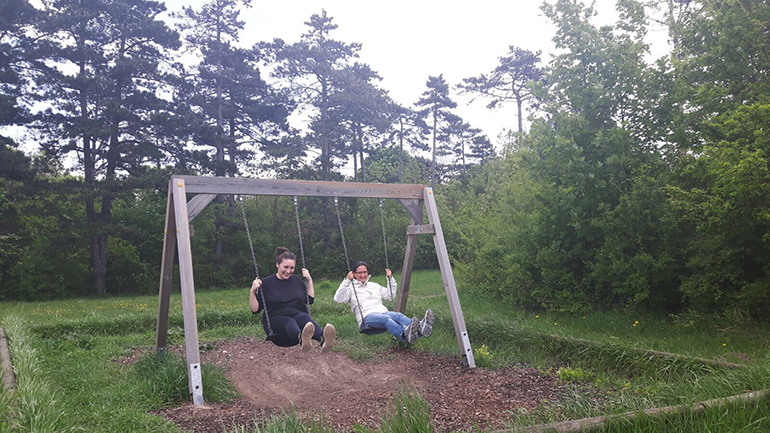You will encounter many amazing things on your study abroad program, but you will also encounter things that really irk you. It’s inevitable. For example, friends from home or people from your host country may think they are saying the right thing, but it will have the opposite effect.
My post this month involves what not to say to high school exchange students; because, trust me, we probably already know or it’s potentially insensitive to us or our host community.
5 Things You Should Never Say to Students Studying Abroad:
“I miss you, come home!”
Just stop after saying, “I miss you.”
No, Susane, who I haven’t spoken to since sixth grade, you do not miss me. When you don’t ask how I’m doing, or how I’m adjusting to my new life, what you are really implying is that you want me home for your own selfish needs, or you are just filling up your Facebook feed.
Imagine the impact that kind of message could have on someone who is homesick or having a hard time adjusting.
When someone urges you to come home it feels like you are being asked not to change or grow. “Home” is now a relative term to me. My ‘home’ isn’t where I was a year ago because I’ve changed since moving to Austria. While I may return to Chicago, I will bring a part of Vienna ‘home’ with me.
Instead of encouraging me to return to my previous life, please encourage me to live life to its fullest in my host country.

“You should learn more ________.”
If I had a euro for every time I have heard “du musst mehr Deutsch lernen” (you have to learn more German), I could buy myself a new car. Thank you, Captain Obvious, for your astute observation. One of the reasons I’m studying in Austria is to learn the language. Learning a language along with a new culture in a short period of time is hard.
I understand that as a native you would like me to understand what you are saying, and be able to have a conversation without me having to look at a translator app. What you may not realize is that I would like the same thing, but I need the time and experience to get there. Pressuring me to be 100% fluent is not realistic. Expressing your opinion on my lack of language skills is not a “motivational tool”, and it’s counterproductive.
Instead, just please help me out. Feel free to correct me—I’ll appreciate it. It’s how I will learn.
“How is your trip going?”
It’s much more than a “trip.” This isn’t a weekend getaway to Miami. I’ve committed to living in a different culture in a different country on a different continent all while speaking a language I’m just learning. It’s called an “exchange” program rather than a ‘trip’ for a reason.
I’m living a whole other life. I understand that you mean well, but please consider the difference.

“Why do you do ________ differently?”
Sigh.
I’m not from from around here. Because you have been doing something/living a certain way for however many years doesn’t mean everyone else around the world does it that way, too (I admit, I’ve had to learn this as well).
I won’t instinctively know your country’s mannerisms because I am not a native. That’s why I am here. To learn.
“How did your parents let you move away for a year? I could never do that!”
My parents “let” me live abroad because they understand how important it is to experience other cultures in order to grow (see above). They believe in me enough to provide me with this experience.
An exchange is about going outside of your comfort zone to expand your horizons. If you want to live in a little cultural bubble, go ahead.

When You Assume, You Make an…
Don’t assume that I’m stupid.
Just because I can’t articulate my thoughts properly in a second language doesn’t mean I’m unable to do it in my own language. Learning another language is extremely difficult and requires a lot of energy. When I take a little longer to reply, please understand I am literally switching over to a different vocabulary and grammar structure.
I am also sifting through cultural references, looking for related experiences. This can be overwhelming and exhausting. High school students abroad are some of the bravest people out there. Please don’t belittle or mock them because they aren’t quick to answer. They are trying their best!

Don’t assume that since a couple of people from one country do something that everyone else from there does it, too.
Stereotypes are a tricky topic. It’s something we all do subconsciously. If we don’t have extensive knowledge about a culture, and are provided very little information about it apart from references such as Hollywood films, the wrong things are often blown way out of proportion.
This one cuts both ways, and I have heard it from both sides. For example, when you mention Austria and Germany to Americans, many of us immediately think of:
- Dancing in the mountains wearing Lederhosen and swinging a stein of beer (I’ve learned never to mention “The Sound of Music” to Austrians)
- Nazis and Hitler
When I have asked Austrians what they think about Americans, I have heard:
- We are fat and unhealthy people
- We all own guns
We all know not everyone does these things. Some Austrians wear traditional gear for special occasions and don’t support Hitler’s ‘beliefs’. And not every American is an unhealthy gun freak. Yet, we all still continue to push these overused stereotypes.

It can be hard to say the ‘right thing’ to foreigners in your country. You never know how something might be interpreted differently in their homeland. Just try to educate yourself and use empathy. Make it an opportunity to learn about a different culture instead of shying away from it. And take precautions with your words.
What you may think is friendly or “just a joke” can be interpreted a different way and hurt someone’s feelings. Please be a good ambassador for your county and help us be great guests.

Very good again… oh I will miss you 🙁
Anastasia, this post was a challenge to read, more for the messages. It is true that when you live abroad, you can never go back home, even when you go home. I know this as well as my year in India changed me in many ways. Your time in Austria was full of challenges and successes and you have grown because of it. My hope is that you take the best of Austria and the United States and become more reflective and more adaptive. You have much more traveling to do, and I know you will become a very interesting person for it.
Cousin Anastasia I applaud you. This truly is a great thing you are doing. It will last a lifetime plus impress upon you all the wonderful people out there. And German is not easy to learn Illa kallish
Having moved between the German and American culture many times by now, as well as within other cultures, I very much relate to all you eloquently explained above. All of those message are true for anyone from any country. We are actually all quite similar in needing to know those things. Well observed and brave for putting it out there!
Ich freue mich bald mehr von deiner Erfahrung dort zu hören.
Bis bald,
Sanna